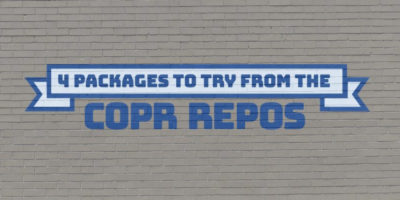HyperKitty is here!
What’s HyperKitty, you may ask? It’s a cute name for something that’s not actually particularly feline (and while we hope you’ll think it’s hyper-good, it’s not hyperactive). It’s a new, modern web interface for all the Fedora mailing lists. At Flock this August, I spoke about how much of Fedora’s vital activity is buried behind increasingly archaic Internet technologies — mailing lists and IRC (Internet Relay Chat). We’ll leave IRC for another day, but HyperKitty is part of the scheme to bring that to the visible web-based world — without taking away the things that are working.
HyperKitty is the official web interface for Mailman3, and we’re migrating most of our lists over this week After migration, you should be able to use the new Hyperkitty UI to read and post to the lists, or you can continue to get emails in the traditional way. Registered Fedora users can even post to the lists without needing to subscribe individually, and the online archives will be millions of times more usable.
There may be some changes in some headers, so if you filter your list emails, be ready to adjust your filters. See the wiki page for details on the migration.
Fedora 24 Election Cycle
With F23 out the door, it’s time to refresh our community governance. Nominations are now closed, and we’re in the campaign period. See the nominations for Fedora Council (our top–level leadership and governance body), FESCo (the Fedora Engineering Steering Committee), and FAmSCo (the Fedora Ambassadors Steering Committee, which is in the midst of a refresh/update — see this discussion on the Fedora Council mailing list). Note that previously we’ve run interviews on Fedora Magazine, but this time around, they’ll be on the new Fedora Community Blog, so make sure you don’t miss seeing them. Voting will start on December 8th.
Those list links go to HyperKitty, by the way, so this is a good excuse to check it out.
DevConf.cz talk submission Deadline
DevConf.cz is an annual tech /open source / developer conference run by the Red Hat Czech office in Brno, Czech Republic. It’s free, and attracts thousands of people every year. We usually have a lot of Fedora activity, and I’ll be there with a State of Fedora talk. Which I need to remember to submit! If you have something to contribute, you should submit one too! The deadline is November 30.
Wayland is default in Rawhide
Wayland is the next-generation graphics stack which will eventually replace the current graphics system, called X11.
Fedora developer Ray Strode recently posted to the Fedora Developers list with the news that Wayland is now used by default in Rawhide — Fedora’s always-moving development branch — when you log into GNOME with Fedora Workstation. Previously, to try out Wayland with Workstation, there was an additional session in the login screen that allowed you to choose to either login with Xorg or Wayland. This change is part of the much-anticipated proposed Fedora 24 feature, “Wayland by Default“.
Ray also noted that as the change is still proposed, if “Wayland by Default” doesn’t pan out or the change isn’t approved, Rawhide will be switched back to having both sessions. The goal is to make the experience basically seamless, and there’s definitely some things to work out. But, as Ray says, “it’s good to get this in Rawhide now, so we can get as much exposure as possible to potential Wayland problems and get them fixed up before release.” So if you use Rawhide, test away and file bugs!
Python 3 Fedora Activity Day overview
Last weekend — not the previous one, the one before that — there was a Fedora Activity Day — a “FAD” — where over two dozen Fedora Python developers across the world worked on porting older Python 2 packages in Fedora to Python 3. This comes not long after the Fedora 23 release, which defaults to using Python 3 instead of Python 2 for most packages shipped by default. This was also an opportunity for one of the more uncommon Fedora badges to be awarded, the Parselmouth badge. You can learn more about what went on for the Activity Day by reading summaries by Abdel Gadiel Martínez Lassonde or Matej Stuchlik. There’s also a lot more to be done, so if you’re a Python-ista, join #fedora-python on Freenode IRC to find out how you can contribute.
Thanks again to Justin W. Flory and the CommOps team for help in putting this together! And Happy Thanksgiving to everyone for whom that’s a Thing.






Andre GompeL
I use FEdora 23 workstation (x86_64)
With Mate (latest 1.12 I recalll) (And sometimes LXQt)
I do NOT if I use the AMD driver open source or proprietary.
Now how could I test Wayland with MATE and perhaps LxQt ?
Thanks.
arehtykitna
I believe Wayland is only applicable for Workstation’s GNOME desktop environment. MATE and LXQt still use X11.
sean
It would be nice to know how -far- they got with the python2->3 upgrade, and what packages are left if any.
Samuel Sieb
http://www.abdelmartinez.com/2015/11/python-3-porting-fad-results.html
http://portingdb-encukou.rhcloud.com/
Kevin Kofler
But it actually took away several things that were working in the old pipermail:
* All the existing links into the pipermail archives no longer work! First they were redirected to wrong messages, now they just give a 404.
* The archives can no longer be viewed without JavaScript.
* The archives are no longer fully functional in older browser engines (e.g. KHTML).
* The message view loses all indentation in the original messages. (And even if that were fixed, the choice of a proportional font means some messages would still not display correctly.)
* Precise and fixed timestamps were lost, replaced by vague relative times.
etc.
Matthew Miller
Yeah, that should be fixed. 🙁
I believe that you can download the archive without, at least.
True.
yeah, this could be smarter.
That might be a matter of browser or not using Javascript? I see full timestamps.